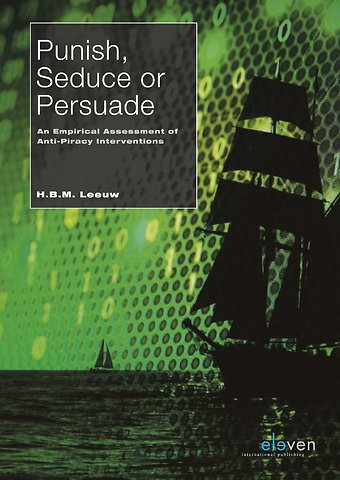Punish, Seduce or Persuade
An Empirical Assessment of Anti-Piracy Interventions (PDF-Download)
Samenvatting
Many kinds of interventions have been designed and implemented to combat digital copyright infringement, a type of cyber-deviance that is also known as ‘digital piracy’. However, it is not clear whether such measures are indeed effective in reducing this type of deviance. This research sets out out to examine the functioning of these interventions from an empirical perspective. The persistence of digital copyright infringement presents challenges to governments, the creative industries and other stakeholders that attempt to curtail digital piracy.
The author combines both traditional and innovative research methods in order to establish whether and to what extent these interventions are able to reduce digital piracy. This book is of interest to organisations and individuals that in charge of developing copyright laws and policy or the enforcement thereof. The focus on the evaluation of digital policy also makes the book relevant to evaluators, criminologists and those interested in digital behaviour and digital policy.
Trefwoorden
Specificaties
Inhoudsopgave
1.1. The status quo of digital piracy 4
1.2. The modus operandi of digital piracy 6
1.3. Delineating the concept of digital piracy 8
1.4. The relationship between digital piracy and copyright law 11
1.5. The discrepancy between copyright law and digital behaviour 13
1.6. Anti-piracy interventions 14
1.7. Objectives of the research and research question 16
1.8. Outline of the book 21
2. Research Methodology 23
2.1. The literature review: adopting the ‘realist synthesis’ approach 23
2.2. The first empirical study: the stated preference method 30
2.2.1. Data collection procedure 33
2.2.2. Data analysis 35
2.3. The second empirical study: Big Data and online search behaviour 38
2.3.1. Data collection procedure 40
2.3.2. Data analysis 43
2.3.3. Attributing the changes to the anti-piracy intervention 44
2.4. Conclusion 45
3. The Scope and Consequences of Digital Piracy 49
3.1. The Pirate Bay: a demonstration of scope 50
3.2. Understanding the consequences of digital piracy 52
3.2.1. The substitution effect 53
3.2.2. The sampling effect 54
3.2.3. The complementary consumption effect 55
3.2.4. Taking stock of the three effects 56
3.3. Music piracy 56
3.3.1. The scope of music piracy 56
3.3.2. The consequences of music piracy 59
3.4. Movie and television piracy 62
3.4.1. The scope of movie and television piracy 62
3.4.2. The consequences of movie and television piracy 64
3.5. Software and video game piracy 66
3.5.1. The scope of software and video game piracy 67
3.5.2. The consequences of software and video game piracy 71
3.6. Conclusion 74
4. How can the Behaviour of Digital Pirates be Explained? A Synthesis through the Lens of the Situational Action Theory 77
4.1. The three main ‘clusters’ of the SAT: the individual’s characteristics, the environmental features and the process of choice 78
4.1.1. Individual characteristics 79
4.1.2. The environmental features 81
4.1.3. The process of choice 82
4.1.4. Usage of the SAT in the context of digital piracy 84
4.2. A snapshot of the studies 86
4.3. The propensity of the individual: which characteristics seem to matter? 87
4.3.1. Desires 87
4.3.2. Morality 88
4.3.3. Beliefs 88
4.3.4. Gender 89
4.3.5. Age 89
4.3.6. Computer experience 89
4.3.7. Education 89
4.3.8. Income 90
4.4. The environmental features: which features seem to matter? 90
4.4.1. The presence of temptations 90
4.4.2. The presence of provocations 91
4.4.3. The moral context 91
4.4.4. The presence of deviant peers 93
4.5. The process of choice: which components seem to matter? 93
4.5.1. Perceptions 94
4.5.2. Self-Control 96
4.5.3. Deliberation and neutralization 96
4.5.4. Habit 97
4.6. Conclusion 98
5. How to Discourage Digital Pirates: Focusing on Anti-Piracy Interventions and Their Mechanisms 103
5.1. Some examples of anti-piracy interventions 104
5.2. Stick-based interventions: an exploration 106
5.2.1. Civil lawsuits 108
5.2.2. Enforcement through the criminal law 110
5.2.3. The graduated response scheme 111
5.2.4. Designed to frustrate: deterrence through technical restrictions 114
5.2.5. Do stick-based interventions reach the appropriate target population? 117
5.3. Carrot-based interventions 119
5.3.1. Pricing strategies 121
5.3.2. New ways to distribute content as a way to make the content more attractive 124
5.3.3. Streaming services 125
5.3.4. DRM-free content 127
5.3.5. Do carrot-based interventions reach the appropriate target population?. 127
5.4. Sermon-based interventions 128
5.4.1. Benefits of legal content 129
5.4.2. Educational campaigns 130
5.4.3. Fear appeals and harm attribution 131
5.4.4. Do sermon-based interventions reach the appropriate target population? 134
5.5. Conclusion 135
6. An Assessment of Anti-Piracy Interventions: Requirements for the Three Mechanisms 139
6.1. Requirements for interventions using the deterrent mechanism 140
6.1.1. Certainty of punishment 141
6.1.2. Severity of the punishment 150
6.1.3. Complementary with the carrot: the stimulation of alternative behaviour 156
6.2. Requirements for interventions using the incentive-mechanism 158
6.2.1. The attractiveness of the incentive: introducing lower prices 159
6.2.2. Consideration of non-financial incentives 162
6.2.3. Complexity of the desired behaviour 165
6.2.4. Avoidance of negative framing 165
6.3. Requirements for interventions using the persuasive mechanism 166
6.3.1. Ease of the desired behaviour 166
6.3.2. Introduction of novel information 166
6.3.3. The believability of the message 167
6.3.4. The use of positive symbols 168
6.3.5. Identifying the benefits of legal content 169
6.3.6. Aligning the desired behaviour with those of the target population 170
6.3.7. Meaningful fear appeals and harm attributions 173
6.4. Conclusion 176
7. Measuring the Contributions of Anti-Piracy Interventions and Their Mechanisms 179
7.1. Past content consumption and digital piracy 180
7.1.1. The Dutch sample 181
7.1.2. The Belgian sample 182
7.2. Developing the scenarios 183
7.2.1. Finding a baseline: the role of ‘scenario zero’ 184
7.2.2. Requirements used to generate a deterrent effect 186
7.2.3. Requirements needed to make the incentive attractive 188
7.2.4. Requirements in order to persuade the target population 189
7.2.5. The 12 pairs of scenarios 191
7.3. The mechanisms at work: their contributions to reductions in digital piracy 193
7.3.1. Most convincing mechanism and strength of conviction (Dutch sample) 193
7.3.2. How the scenarios influence the respondents’ inclination to pirate content (Dutch sample) 195
7.3.3. Most convincing scenarios and strength of conviction (Belgian sample) 197
7.3.4. How the scenarios influence the respondents’ inclination to pirate content digitally (Belgian sample) 198
7.4. A closer look at the requirements 200
7.4.1. Responses to the requirements in the Dutch sample 200
7.4.2. Responses to the requirements in the Belgian sample 203
7.5. Differences in responses between men and women 205
7.6. Methodological limitations and their consequences for the findings 207
7.6.1. The findings contrasted with the background of the sample 207
7.6.2. Influence of the design on the responses to the scenarios 209
7.7. Contextualizing the findings 210
7.7.1. The preference for the deterrent scenarios and the relevance of formal deterrence 210
7.7.2. The relevance of the severity of the punishment 211
7.7.3. The cost of content and the attractiveness of the incentive 212
7.7.4. The relevance of the role of viruses 212
7.7.5. Why the sermon fails to contribute to reductions 214
7.7.6. Considering the benefits of a more hybrid approach 215
7.8. Conclusion 215
8. Changes in Online Search Behaviour after the Implementation of an Anti-Piracy
Intervention: the Copyright Alert System as a Case Study 217
8.1 The CAS and its assumed influence on digital piracy 219
8.2. Mapping online search behaviour222
8.3. Observed changes in online search behaviour 225
8.3.1. Short-term observed changes 225
8.3.2. Longer-term observed changes 229
8.4. Observing the counterfactual: what if the CAS had not been implemented? 233
8.4.1. Selecting the ‘control’ jurisdiction 233
8.4.2. Analysing the Canadian results 234
8.5. Conclusion 237
9. Conclusion and Future Outlook 241
9.1 A closer look at the most important findings 243
9.1.1. The link between the mechanisms and variables explaining digital piracy 243
9.1.2. What can the mechanisms really modify in terms of behaviour? 245
9.1.3. Changing perceptions 247
9.1.4. The relevance of morality as both an explanation of digital piracy and an obstacle to behavioural change 249
9.1.5 Reaching and addressing the subgroups of digital pirates? 251
9.1.6. The merits of ‘entwined’ anti-piracy interventions? 253
9.1.7. The limits of anti-piracy intervention? A balance between input and output 254
9.2 A look towards the future: six scenarios to consider 256
9.2.1. The introduction and wide-spread availability of 3D-printers 257
9.2.2. Changing the demographics of digital piracy: geriatric pirates of the Caribbean? 259
9.2.3. An abundance of legal content: risk of competition and cannibalization 261
9.2.4. Streaming becomes the dominant form of content consumption 263
9.2.5. Digital piracy in your pocket 265
9.2.6. New and innovative ways to study digital piracy 266
9.3. Limitations of the research and recommendations for future research 267
9.3.1. Substantive limitations 267
9.3.2. Methodological limitations 268
9.4 Final remarks 269
Bibliography 273
Valorisation Addendum 303
Nederlandstalige Samenvatting 307
Appendix I: Reference list for the realist synthesis 317
Appendix II: The 24 scenarios 325
Curriculum vitae 329
Anderen die dit e-book kochten, kochten ook
Rubrieken
- cadeauboeken
- computer en informatica
- economie
- filosofie
- flora en fauna
- geneeskunde
- geschiedenis
- gezondheid
- jeugd
- juridisch
- koken en eten
- kunst en cultuur
- literatuur en romans
- mens en maatschappij
- naslagwerken
- non-fictie informatief/professioneel
- paramedisch
- psychologie
- reizen
- religie
- schoolboeken
- spiritualiteit
- sport, hobby, lifestyle
- thrillers en spanning
- wetenschap en techniek
- woordenboeken en taal









